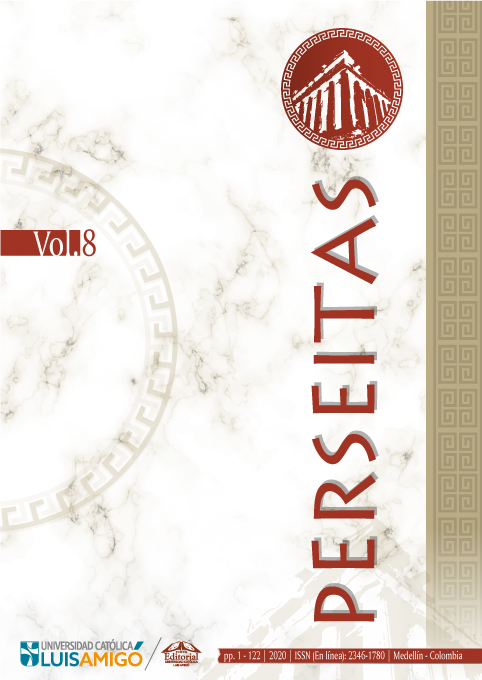Towards the interdisciplinary construction of an anthropology of pain in franciscan perspective
DOI:
https://doi.org/10.21501/23461780.3606Keywords:
Anthropology of pain, Humanism, Interdisciplinarity, Pain, Sense, Suffering, Saint Francis of AssisiAbstract
The general purpose of the research work, which is presented below, is intended to conduct a systematic study around the sense of pain in an interdisciplinary perspective, in order to make approaches to a new vision that favors the meaning and meaning of pain by presenting the validity and validity of the evangelical sense of the latter in Francis of Assisi, through a hermeneutical study and documentary analysis. Discussion: Pain makes us aware of our existence in the world of individuality, limits and corporeality. Every human being has ever experienced pain, so it is said that it is something inherent and intrinsic to the human condition, even if you don't want to, don't look for it, you want to run away or evade it, despite being in some cases something inevitable. The method to follow is the documentary, guided by hermeneutics, in order to congregate the different truths constructed from the different disciplines that go to the study of this topic. Conclusion: pain cannot be reduced to a neurological or organic fact exclusively. Human pain requires an interdisciplinary treatment, if what is sought is to provide for an integral view, recognizing the contribution of multiple epistemological intentions and human sciences that come to the study of pain.
Downloads
References
Alzate, N. (2019). Alzate, N. (2019). La riqueza del concepto pobreza: una mirada hacia la celebración de los 50 años del documento MEDELLÍN. Kavilando, 66-86. Obtenido de http://www.kavilando.org/revista/index.php/kavilando/index
Ardila, R. (1978). Psicología fisiológica. México: Trillas.
Berdiaev, N. (1955). Esclavitud y libertad del hombre. Buenos Aires: Emecé.
Le Breton, D. (2002). Antropología del cuerpo y modernidad. Buenos Aires, Argentina: Nueva visión.
Colombo, G. (1999). La enfermedad: tiempo para la valentía. Bogotá: San Pablo.
Ellis, A. (1980). Razón y emoción en psicoterapia. Barcelona: Plaza & Janes.
Esser, K. (2002). Gli scritti di S. Francesco D´Assisi. Recuperado de http://www.fratellidisanfrancesco.it/index.php?option=com_content&view=article&catid=21:san-francesco-dassisi&id=71:gli-scritti-di-san-francesco:com_content&view=article&catid=21:san-francesco-dassisi&id=71:gli-scritti-di-san-francesco
Fernández, H. (2001). Acercamiento a la problemática del sufrimiento en el mundo. Cuadernos Franciscanos, 1(7), 189-191.
Forthomme, B. (2010). La antropología según el espíritu franciscano. Selecciones de Franciscanismo, (120), 381-404.
Franciscanos.org. (2018). Celano: Vida segunda de San Francisco, 26-54 [Entrada en un sitio web]. Recuperado de http://www.franciscanos.org/fuentes/2Cel02.html
Iammarrone, G. (2012). La visión del hombre en la regla bulada de los hermanos menores. Selecciones de Franciscanismo, (121), 27-49.
Jasper, K. (1978). Clarificazione della essistenza. Milano: Milano.
Juan Pablo II. (1984). Carta Apostólica Salvifici Doloris. El Vaticano. Recuperado de http://www.vatican.va/roman_curia/pontifical_councils/hlthwork/documents/hf_jp-ii_apl_11021984_salvifici-doloris_sp.html
Morgan, C. T. (1968). Psicología fisiológica. México: McGraw-Hill.
Mota, R. (1983). Documentos Franciscanos en el archivo histórico de protocolos de Madrid. Madrid, España: Archivo Ibero-Americano.
San Francisco de Asís. (1980). San Francisco de Asís: escritos, biografías, documentos de la época. J. A. Guerra (Ed.). Madrid, España: BAC.
Young, J. (2001). Cognitive therapy for personality disorders. Florida, Estados Unidos: Sarasota.
Published
How to Cite
Issue
Section
License
Copyright (c) 2020 Perseitas

This work is licensed under a Creative Commons Attribution-NonCommercial-NoDerivatives 4.0 International License.
La revista y los textos individuales que en esta se divulgan están protegidos por las leyes de copyright y por los términos y condiciones de la Licencia Creative Commons Atribución-No Comercial-Sin Derivar 4.0 Internacional.
















